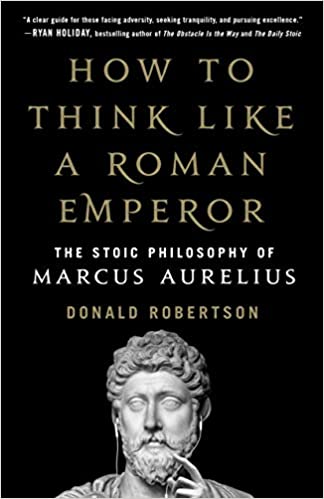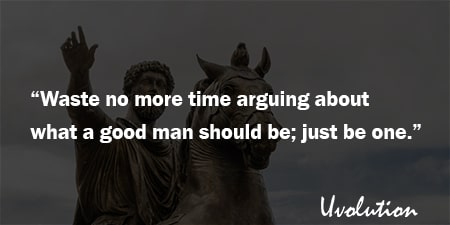How to Think Like a Roman Emperor by Donald Robertson Summary
The Book in 1 Sentences
How to Think Like a Roman Emperor: The Stoic Philosophy of Marcus Aurelius
“The Stoics can teach you how to find a sense of purpose in life, how to face adversity, how to conquer anger within yourself, moderate your desires, experience healthy sources of joy, endure pain and illness patiently and with dignity, exhibit courage in the face of your anxieties, cope with loss, and perhaps even confront your own mortality while remaining as unperturbed as Socrates.
Marcus Aurelius faced colossal challenges during his reign as emperor of Rome. The Meditations provides a window into his soul, allowing us to see how he guided himself through it all.
Indeed, I would invite you, as a reader, to put effort into reading this book in a special way, to try and place yourself in Marcus’s shoes and look at life through his eyes, through the lens of his philosophy. Let’s see if we can accompany him on the journey he made as he transformed himself, day by day, into a fully-fledged Stoic.
Fate permitting, more people may be able to apply the wisdom of Stoicism to the real challenges and everyday problems of modern living. However, that change won’t leap off the page.
It only comes by making a firm decision, here and now, to begin putting ideas like these into practice. As Marcus wrote to himself, Waste no more time arguing about what a good man should be; just be one.” ~ Donald Robertson
6 BIG Ideas
How to Think Like a Roman Emperor Book Summary
1. The goal of life
“The schools of Hellenistic philosophy that followed the death of Socrates were often
distinguished from one another in terms of their definition of the goal of life.
For Stoics, that goal is defined as ‘living in agreement with Nature,’ which we’re told was synonymous with living wisely and virtuously. Stoics argued that humans are first and foremost thinking creatures, capable of exercising reason.
Although we share many instincts with other animals, our ability to think rationally is what makes us human. Reason governs our decisions, in a sense—the Stoics call it our ‘ruling faculty.’ It allows us to evaluate our thoughts, feelings, and urges and to decide if they’re good or bad, healthy or unhealthy.
We therefore have an innate duty to protect our ability to reason and to use it properly. When we reason well about life and live rationally, we exhibit the virtue of wisdom. Living in agreement with Nature, in part, means fulfilling our natural potential for wisdom; that’s what it means for us to flourish as human beings.
The Stoics therefore took the name of philosophy, meaning ‘love of wisdom,’ quite literally. They loved wisdom, or loved virtue, above everything else. If ‘virtue’ sounds a bit pompous, the Greek word for it, arete, is arguably better translated as ‘excellence of character.’
Something excels, in this sense, if it performs its function well. Humans excel when they think clearly and reason well about their lives, which amounts to living wisely. The Stoics adopted the Socratic division of cardinal virtues into wisdom, justice, courage, and moderation.
The other three virtues can be understood as wisdom applied to the social sphere, our relationships with other people.
Displaying courage and moderation involved mastering our fears and desires, respectively,
overcoming what Stoics called the unhealthy ‘passions’ that otherwise interfere with our ability to live in accord with wisdom and justice.”
2. Live with Virtues
“At one point, Socrates explains in plain language what it means to him to be a philosopher: ‘For I go around doing nothing but persuading both young and old among you not to care for your body or your wealth in preference to or as strongly as for the best possible state of your soul, as I say to you:
‘Wealth does not bring about virtue, but virtue makes wealth and everything else good for me, both individually and collectively.’”
“Marcus makes it clear that his internal goal is to live with virtue, particularly wisdom and justice, but his external aim, his preferred outcome, is the common welfare of mankind (not
just of Roman subjects, incidentally). Although the outcome is ultimately indifferent to Stoics, it’s precisely the action of pursuing the common good that constitutes the virtue of justice.”
“Zeno told his students that he had come to value wisdom more than wealth or reputation. He used to say, ‘My most profitable journey began on the day I was shipwrecked and lost my entire fortune.’”
“Marcus actually imagines Nature herself as a physician, like Asclepius, the god of medicine, prescribing hardships to him as if they were painful remedies. To take Nature’s medicine
properly, we must accept our fate and respond virtuously, with courage and self-discipline,
thereby improving our character.”
“They taught the young Marcus that inner calm and happiness are natural consequences of a life lived well, in accord with genuine wisdom and self-discipline.”
3. The ideal version of yourself
“Your first step is to write down the virtues exhibited by someone you respect. Listing the
qualities you most admire in another person, just as Marcus does in the first book of The
Meditations, is a simple and powerful exercise. ...
In addition to the virtues of real people, the Stoics were also known for contemplating the
hypothetical character of an ideal Sage, or wise person. There are several passages where Marcus appears to be doing this. These descriptions inevitably seem a bit more abstract and grandiose.
For example, he says that the perfect wise man is like a true priest of the gods, at one with the
divine element of reason within himself. He is neither corrupted by pleasure nor injured by
pain, and he remains untouched by insults.
The true Sage is like a fighter in the noblest of fights, dyed deep with justice. With his whole being, he accepts everything that befalls him, as assigned him by Fate. He seldom concerns himself with what others say or do unless it’s for the common good.
He naturally cares for all rational beings, as though they were his brothers and sisters. He
is not swayed by the opinions of just anyone, but he gives special heed to the wise who live in
agreement with Nature.
Marcus is trying here to describe human perfection to himself and to envisage an ideal Sage who completely embodies the Stoic goals of life.
In addition to asking ourselves what qualities the ideal wise person might have, we can ask what qualities we might hope to possess in the distant future. For instance, what sort of person would you hope to be after having trained in Stoicism for ten or twenty years?”
“This famous passage from [Pythagoras’s] ‘The Golden Verses,’ which Epictetus quoted to his students, describes the evening meditation:
Allow not sleep to close your wearied eyes, Until you have reckoned up each daytime deed:
‘Where did I go wrong? What did I do? And what duty’s left undone?’
From first to last review your acts and then Reprove yourself for wretched acts, but rejoice in those done well.”
4. Stoic joy
“Modern English isn’t well equipped to capture some of the distinctions made in ancient
Greek philosophy, especially when it comes to describing emotions and sensations. We use
the word ‘pleasure’ very broadly to encompass almost any positive feeling.
However, the Stoics distinguished between the sort of pleasure (hedone) we get from ‘external’ things like food or sex or flattery and the deeper sense of inner joy (chara) that Marcus is talking about.
Stoic joy is profound. It comes from achieving your fundamental goal in life and experiencing genuine fulfillment, which make ordinary pleasures seem trivial by comparison.
Ordinary pleasures often ruffle our minds, especially when indulged in too much. Stoic joy never does this—it’s synonymous with inner peace and knows no excess. The Stoics refer to it as the pure form of ‘joy’ that someone experiences who is living a truly great life and has attained genuine personal fulfillment (eudaimonia).
Of course, none of us are there yet, but all of us may, potentially, glimpse the goal as long as we’re heading in the right direction.”
“The Stoics tended to view joy not as the goal of life, which is wisdom, but as a by-product of it, so they believed that trying to pursue it directly might lead us down the wrong path if it’s sought at the expense of wisdom.”
“The wise man’s sense of delight comes from one thing alone: acting consistently in accord with virtue.”
“The Greek word for joy (chara) is closely related to that for gratitude. (charis).”
5. Time projection .. Decatastrophizing
“Another simple and powerful technique is to ask yourself how you would feel about the
situation that worries you in ten or twenty years’ time, looking back on it from the future.
It’s an example of a more general strategy known as ‘time projection.’ In other words, you can help yourself develop a philosophical attitude toward adversity by asking, ‘If this will seem trivial to me twenty years from now, then why shouldn’t I view it as trivial today instead of worrying about it as if it’s a catastrophe?’
You’ll often find that shifting your perspective in terms of time can change how you feel about a setback by making it seem less catastrophic.”
“For instance, when people disagreed with Marcus, he first tried to persuade them to see things from his perspective. However, if they persisted in obstructing what he believed to be a just course of action, he remained calm and transformed the obstacle into an opportunity
to practice some other virtue, such as patience, restraint, or understanding.
His equanimity remained intact as long as he never desired what was beyond his grasp, which constitutes one of the foundations of the Stoic remedy for worry and anxiety.”
6. The choice of Hercules
“‘What do you think Hercules would have amounted to,’ Epictetus asks his students, “if there had not been monsters such as the Nemean lion, the Hydra, the stag of Artemis, the Erymanthian boar, and all those unjust and bestial men for him to contend with? Why, if he had sat at home, wrapped up asleep in bedsheets, living in luxury and ease, he would have been no Hercules at all!’
Epictetus tells his students that just as Hercules cleansed the earth of monsters—without
complaining—they should set about conquering themselves by purging the base desires and
emotions from their hearts.
For Stoics, in other words, the tale of Hercules symbolizes the epic challenge of deciding who
we really want to be in life, the promise of philosophy, and the temptation of giving in to
pleasure and vice.
The moral is that it often requires a Herculean effort to keep to the right path. But wasn’t Hercules’s life unpleasant? As we’ll see, from the Stoic perspective, Hercules remained cheerful, despite the terrible things he endured.
He enjoyed a profound sense of inner satisfaction knowing that he was fulfilling his destiny and expressing his true nature. His life had something far more satisfying than pleasure: it had purpose.”
“Epictetus liked to tell his students that in the face of everything that befalls them, they should get into the habit of asking themselves what capacity, or virtue, they possess for making good use of the event.”
That was my QUICK summary of the great book How to Think Like a Roman Emperor by Donald Robertson. If you’re interested, get your copy. There is a HUGE amount of life-changing ideas in this book, and we’ve only touched on a tiny bit of it.
Buy The Book: How to Think Like a Roman Emperor by Donald Robertson

GET Blinkist 7 Days FREE Trial
3000+ Book Summaries
(Audio and Text)








